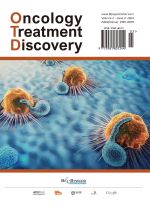Abstract
At present, breast cancer is the largest malignant tumor endangering women’s health, and has become one of the most common cancer types in the world. In recent years, the relationship between psychosocial factors and the incidence of breast cancer has attracted extensive attention. Traditional Chinese medicine research of the motherland suggests that emotional disorder is an important factor leading to breast cancer, and emotional theory and negative emotional accumulation have something in common in some aspects. This article reviews the impact of negative emotions on the risk of breast cancer and the current research progress and explores the possibility of reducing the progress of breast cancer and improving the quality of life of breast cancer patients through negative emotion intervention.
References
World Health Organization (WHO), 2020, World Cancer Report 2020.
Zheng R, Sun K, Zhang S, et al., 2019, Analysis of Malignant Tumour Prevalence in China in 2015. Chinese Journal of Tumours, 41(1): 19–28.
Strange KS, Kerr LR, Andrews HN, et al., 2000, Psychosocial Stressors and Mammary Tumor Growth: An Animal Model. Neurotoxicology and Teratology, 22(1): 89.
Watson D, Clark LA, Tellegen A, 1988, Development and Validation of Brief Measures of Positive and Negative Affect: The PANAS Scales. Journal of Personality and Social Psychology, (6): 1063–1070.
Zhang J, Zhang D, 2019, College Students’ Psychological Quality Level Is Externally and Implicitly Related to Positive and Negative Emotions. Psychological and Behavioural Research, (1): 91–96.
Breast Cancer Professional Committee of the Chinese Anti-Cancer Association, 2021, Chinese Anti-Cancer Association Breast Cancer Diagnosis and Treatment Guidelines and Norms (2021 Edition). Chinese Journal of Cancer, 31(10): 954–1040.
Breast Group of the Women’s Health Branch of the Chinese Preventive Medical Association, 2017, Lifestyle Guidelines for Breast Cancer Patients in China. Chinese Surgical Miscellany, 55(2): 81–85.
Liu S, Sun YP, 2011, Traceability Examination of Chinese Medicine Literature on Breast Cancer. Proceedings of the 2011 Annual Conference of Chinese Medicine Surgery of the Chinese Society of Traditional Chinese Medicine, 118–121.
Hjerl K, Andersen EW, Keiding N, et al., 2003, Depression as a Prognostic Factor for Breast Cancer Mortality. Psychosomatics, 44(1): 30.
Lesiuk T, 2015, The Effect of Mindfulness-Based Music Therapy on Attention and Mood in Women Receiving Adjuvant Chemotherapy for Breast Cancer: A Pilot Study. Oncology Nursing Forum, 42(3): 276.
Humphris GM, Rogers S, McNally D, et al., 2003, Fear of Recurrence and Possible Cases of Anxiety and Depression in Orofacial Cancer Patients. International Journal of Oral and Maxillofacial Surgery, 32(5): 486–491.
Lebel S, Tomei C, Feldstain A, et al., 2013, Does Fear of Cancer Recurrence Predict Cancer Survivors’ Health Care Use? Supportive Care Cancer, 21(3): 901–906.
Li L, Kang F, Li Z, et al., 2019, Effects of Anxiety and Depression and Psychological Resilience on Post-Traumatic Growth in Breast Cancer Patients. Nursing Research, 33(6): 960–965.
Yu W, Zhang A, Xia C, et al., 2018, Study on the Mediating Effect of Psychological Resilience Between Emotional Distress and Post-Traumatic Growth in Breast Cancer Patients. Modern Preventive Medicine, 45(10): 105–109.
Yi JC, Syrjala KL, 2017, Anxiety and Depression in Cancer Survivors. Medical Clinics of North America, 101(6): 1099–1113.
Burgess C, Cornelius V, Love S, et al., 2005, Depression and Anxiety in Women with Early Breast Cancer: Five Year Observational Cohort Study. BMJ, 330(7493): 702.
Gu L, Wang Q, Zhao Y, et al., 2000, Effects of Provocative Stimuli on Monoamine Hormone and T-Lymphocyte Function in Rat Hypothalamus. Chinese Traditional Medicine Information Magazine, 7(8): 44.
Meng L, 2018, Mechanism of Psychological Stress on Liver Tumours Based on the Theory of Anger Injuring the Liver. Pharmaceutical Biotechnology, 25(2): 142.
Sun P, Wei S, Wei X, et al., 2016, Anger Emotional Stress Influences VEGF/VEGFR2 and Its Induced PI3K/AKT/mTOR Signaling Pathway. Neural Plasticity, 2016: 4129015.
Wang Y, Yang J, Qiu L, 2014, Immunomodulatory Effects of Jin Gui Ren Qi Wan on Mice with Fear of Kidney Injury. Jiangxi Traditional Chinese Medicine, 45(11): 29.
Dong Q, Liu X, 2013, Changes of Blood ACTH, CORT, IL-2 and IL-8 Levels in Fear-Stressed Rats. Journal of Molecular Diagnosis and Therapy, 5(3): 173.
Lazarus RS, 1974, Psychological Stress and Coping in Adaptation and Illness. The International Journal of Psychiatry in Medicine, 5(4): 321.
Antoni MH, Dhabhar FS, 2019, The Impact of Psychosocial Stress and Stress Management on Immune Responses in Patients with Cancer. Cancer, 125(9): 1417.
Cohen S, Janicki-Deverts D, Miller GE, 2007, Psychological Stress and Disease. JAMA, 298(14): 1685.
Krhk J, Aboul-Enein BH, Bernstein J, et al., 2019, Psychological Stress and Cellular Aging in Cancer: A Meta-Analysis. Oxidative Medicine and Cellular Longevity, 2019: 1270397.
Shin KJ, Lee YJ, Yang YR, et al., 2016, Molecular Mechanisms Underlying Psychological Stress and Cancer. Current Pharmaceutical Design, 22(16): 2389.
Chang A, Le CP, Walker AK, et al., 2016, b2-Adrenoceptors on Tumor Cells Play a Critical Role in Stress-Enhanced Metastasis in a Mouse Model of Breast Cancer. Brain, Behavior, and Immunity, 57: 106.
Le CP, Nowell CJ, Kim-Fuchs C, et al., 2016, Chronic Stress in Mice Remodels Lymph Vasculature to Promote Tumour Cell Dissemination. Nature Communications, 7: 10634.
Childers WK, Hollenbeak CS, Cheriyath P, 2015, b-Blockers Reduce Breast Cancer Recurrence and Breast Cancer Death: A Meta-Analysis. Clinical Breast Cancer, 15(6): 426.
Liu X, Liu H, Ma L, et al., 2021, Exploring the Correlation Between the Seven Emotions of Chinese Medicine and the Pathogenesis of Breast Cancer Based on the Perspective of Psychological Stress. Chinese Journal of Traditional Chinese Medicine, 46(24): 6377–6386.
